Intarsia
by
As part of its ongoing series interrogating the concept of civil war, UCHRI hosted an event in 2018 entitled Out There, an intimate dialogue centered around questions of territoriality, violence, and belonging as they relate to discourses of outer space. The following meditation on movement from Ainehi Edoro, one of Out There’s interlocutors, emerged from conversations at this event, as part of a discussion unpacking the notion of first walks—on the moon and on other so-called “virgin” territories; who has rights to territoriality, to move where, and in what fashion. The following reflection and compilation by Edoro is animated by artist Miranda Javid, who took inspiration from Edoro’s piece. The result is an example of affinity and collaboration at a distance.
For some people, space has no barrier. Between an American passport and a first-class ticket, mobility can be an unhindered experience. Physical space and political space might appear boundless, leading to fantasies of individual freedom. For others, it is not as simple. Think of migrants stuck in Mount Gurugu, waiting for a chance to cross the Mediterranean Sea into Europe. Some of them have traveled all the way from West Africa through the Sahara Desert, risking life and mental wellbeing to arrive at the borders of Morocco. They feel the weight of physical space and the restrictions of political space. For these travelers, the dispossessed of global capital, space is a recalcitrant thing, alive with the power to prevent movement and, in the case of the Mediterranean Sea, to kill.
The passages below feature a wandering subject confronting a locality and responding to this encounter. They invite us to interrogate our relationship to physical and political space. What forms of political and economic inequities underlie the logic of our mobility?
The collection is divided into two sections. “Fantastical Spaces” are easily converted to fantasies of individual freedom. “Creaturely Spaces” are impossible to appropriate and, as such, bring up questions of fugitivity and exile.
FANTASTICAL SPACE
The three walking moments evoke various ways of imagining space and mobility through fantasies of power and control.
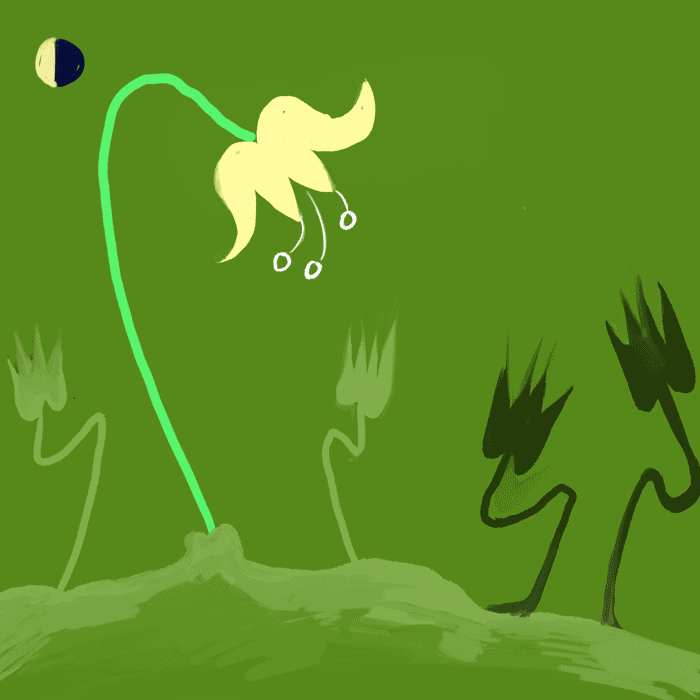
Walking in an Open Space
“When First I Journeyed Hither” by Wordsworth
Walking is the untrammeled power of the body over space. Here the persona in the poem loves “the shady grove” less because it refuses him entry. The opposite is a “sweet” place where one can move omni-directionally with the slightest thought. Walking is the unbounded freedom to move in any direction.
But in the grove, the trees
Had by the planter been so crowded each
Upon on the other, and withal had thriven
In such perplexed array that I in vain
Between their stems endeavored to find out
A length of open space where I might walk
Backwards and forwards long as I had linking
In easy and mechanic thoughtlessness.
And, for this cause, I love the shady grove
Less than I wished to love a place so sweet.
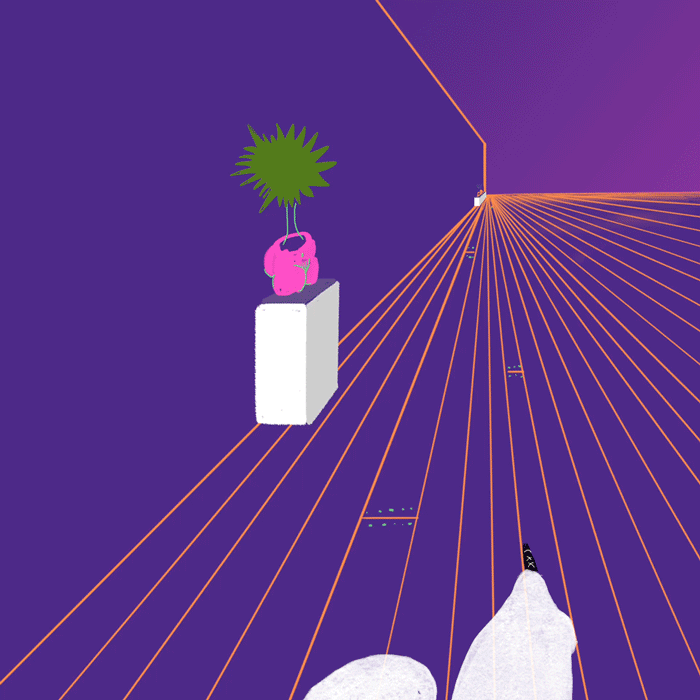
Walking into Apartments in Trees
Robinson Crusoe by Daniel Defoe
Crusoe arrives in a strange island. The land is supposedly savage and abandoned, yet he is immediately able to walk around, acquire refreshments, find lodging, sleep comfortably—things we would imagine him doing in any European town. For the conscientious imperialist, no world is too wild to resist fantasies of the household.
When I waked it was broad day, the weather clear, and the storm abated, so that the sea did not rage and swell as before. But that which surprised me most was, that the ship was lifted off in the night from the sand where she lay by the swelling of the tide, and was driven up almost as far as the rock which I at first mentioned, where I had been so bruised by the wave dashing me against it. This being within about a mile from the shore where I was, and the ship seeming to stand upright still, I wished myself on board, that at least I might save some necessary things for my use. When I came down from my apartment in the tree, I looked about me again, and the first thing I found was the boat, which lay, as the wind and the sea had tossed her up, upon the land, about two miles on my right hand. I walked as far as I could upon the shore to have got to her; but found a neck or inlet of water between me and the boat which was about half a mile broad; so I came back for the present, being more intent upon getting at the ship, where I hoped to find something for my present subsistence.
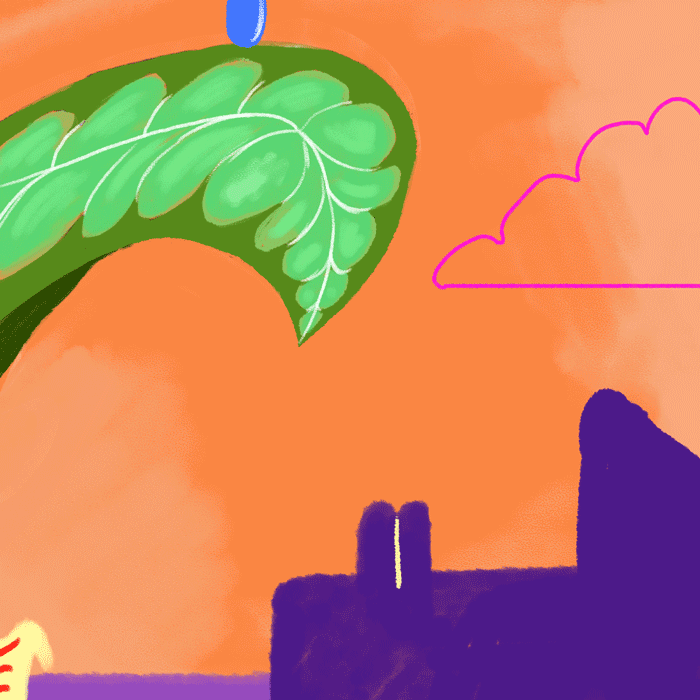
Walking to a Heaving Bosom
Through the Dark Continent by Henry M. Stanley
“Every stranger, at first view of the shores, proclaims his pleasure.”
This is 1874. Celebrated American explorer Morgan M. Stanley has just arrived in Zanzibar, the first leg of his odyssey through Eastern Africa. Here he imagines what a first-time visitor might see on arrival. At the approach of the “incoming wanderer,” the landscape wakes up from a drowsy state to present a colorful and vibrant performance. The burst of color, the reference to trees wearing feathers, crowns, garments, and the image of the buxom island add up to a tropical, sexualized imagery of a space that is available for the “pleasure” of a male wanderer.
Arrival at Zanzibar – The well-remembered undulating ridges, and the gentle slopes clad with palms and mango trees bathed in warm vapor, seemed in that tranquil drowsy state which at all times any portion of tropical Africa presents at first appearance. A pale-blue sky covered the hazy land and sleeping sea as we steamed through the strait that separates Zanzibar from the continent. Every stranger, at first view of the shores, proclaims his pleasure. The gorgeous verdure, the distant purple ridges, the calm sea, the light gauzy atmosphere, the semi-mysterious silence which pervades all nature, evoke his admiration…As he passes close to the deeply verdant shores of Zanzibar Island, he views nature robed in the greenest verdure, with a delightful freshness of leaf, exhaling fragrance to the incoming wanderer. He is wearied with the natural deep-blue of the ocean, and eager for any change. He remembers the unconquerable aridity and the dry bleached heights he last saw, and lo! what a change! Responding to his half-formed wish, the earth rises before him verdant, prolific, bursting with fatness. Palms raise their feathery heads and mangoes their great globes of dark green foliage; banana plantations with impenetrable shade, groves of orange, fragrant cinnamon, and spreading bushy clove, diversify and enrich the landscape. Jack-fruit trees loom up with great massive crowns of leaf and branch, while between the trees and in every open space succulent grasses and plants cover the soil with a thick garment of verdure. There is nothing grand or sublime in the view before him, and his gaze is not attracted to any special feature, because all is toned down to a uniform softness by the exhalation rising from the warm heaving bosom of the island. His imagination is therefore caught and exercised, his mind loses its restless activity, and reposes under the influence of the eternal summer atmosphere.
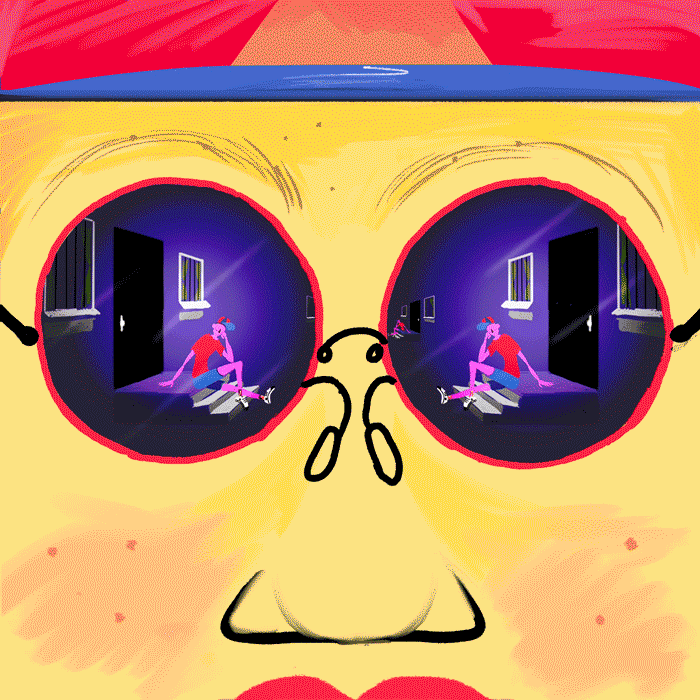
Walking among Commodities
Moscow Diary by Walter Benjamin
The image of Walter Benjamin walking about Moscow eating chocolate while spotting toys and “baskets of delicacies” is striking. It demonstrates a relationship with space mediated through the spectacle of commodities.
I walked the entire length of the Arbat and reached the market on Smolensk Boulevard. The day was extremely cold. As I walked I ate some chocolate that I had bought along the way. The first row of the market which is setup along the street was comprised of booths selling Christmas items, toys, and paper articles. The row behind this was devoted to iron wares, house- hold goods, shoes, etc. It somewhat resembled the market on Arbatskaia Ploschad, but I don’t believe they sold any food provisions here. But even before you reach the booths, the path is so crowded with baskets of delicacies, tree decorations, and toys that you can barely make your way from the street to the sidewalk. I bought a kitsch postcard in one of the booths, and a balalaika and little paper house in one of the others. Here as well I observed Christmas roses on the street, heroic bunches of flowers brightly shining forth from the ice and snow.
CREATURELY SPACE
All three passages are drawn from the African fantasy genre. Space pushes back against the human explorer. Mobility is a constant negotiation with physical world.
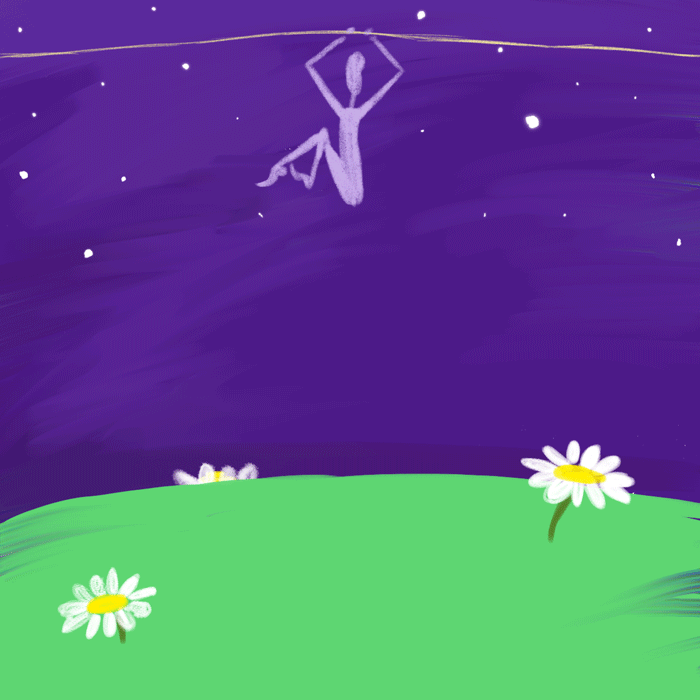
Walking on Talking-land
My Life in the Bush of Ghosts by Amos Tutuola
Amos Tutuola is a fantasist. He draws a lot from the Yoruba literary tradition. His stories take place in a forest terrain infused with magic. The forest is a post/non/a-human world of beasts and creatures called “ghosts.” Movement is non-linear, in part, because space is discontinuous. As a result, the wandering subject is in perpetual flight. This particular scene takes place after the narrator leaves “the 20th town of ghosts.” In hot pursuit by a band of “armless ghosts,” he runs into a patch of land that turns out to be a creature.
I was still running away faster until I stepped into a part of the ground of this bush. But to my surprise at the same moment that I put my left foot on it to be still running away it was saying thus with a loud voice—“Don’t smash me! oh don’t smash me, don’t walk on me, go back to those who are chasing you to kill you, it is paining me too much as you are smashing me.” When I heard this so suddenly, I was so frightened so that I withdrew my foot back at once and I heard no voice again. After that I turned to another part and smashed it with the same foot as well, perhaps that part would not cry out—“don’t smash me.” But I heard the same caution suddenly with louder voice, so I withdrew my foot from it, then I stopped there and asked myself this question—“can land talk like a human being, or can land feel pain if somebody smashes it?”
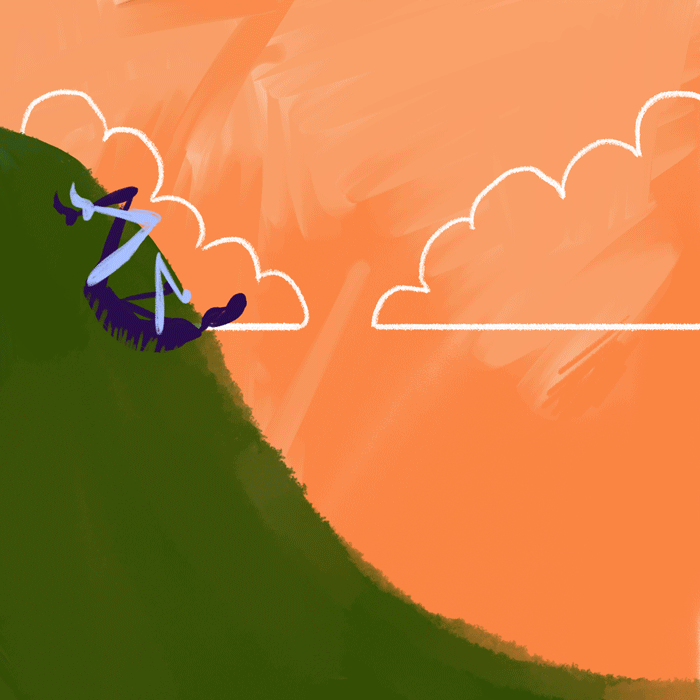
Walking on “Greedy Bush”
The Palmwine Drinkard by Amos Tutuola
Tutuola worlds are recalcitrant. For the human wanderer, space is designed to induce flight as opposed to dwelling or domination. This scene is drawn from Tutuola’s first novel The Palmwine Drinkard. The Drinkard and his wife walk into a bush smelling of oven-baked bread. Before they can abstract the space into a desire for homely comforts, the bush turns sinister.
As we entered the bush, when we had travelled for about 2 miles inside the bush, then we began to notice that there were many trees without withered leaves, dried sticks and refuse on the ground of this bush as was usual in other bushes; as we were very hungry before reaching there, we put down our loads at the foot of a tree. Then we looked around the tree for pieces of dried wood with which to make a fire, but nothing was found there; to our surprise, there was a sweet smelling in every part of the bush, the smelling was just as if they were baking cakes, bread and roasting of fowls or meat; God was so good, we began to snuff the sweet smelling and we were very satisfied with it and we did not feel hungry again. That bush was very “greedy,” so that within an hour from when we sat at the foot of the tree, the ground on which we sat began to warm and we could not sit on it any longer, then we took our loads and went further. As we were going on in this bush, we saw a pond and we branched there, then we started to drink the water from it, but as the water dried away at our presence and also as we were thirsty all the time, and there we saw that there was not a single living creature. But when we saw that the ground of this bush was very hot for us to stand, sit or to sleep on till morning and again the bush did not like anybody to remain there any longer than necessary, then we left there.
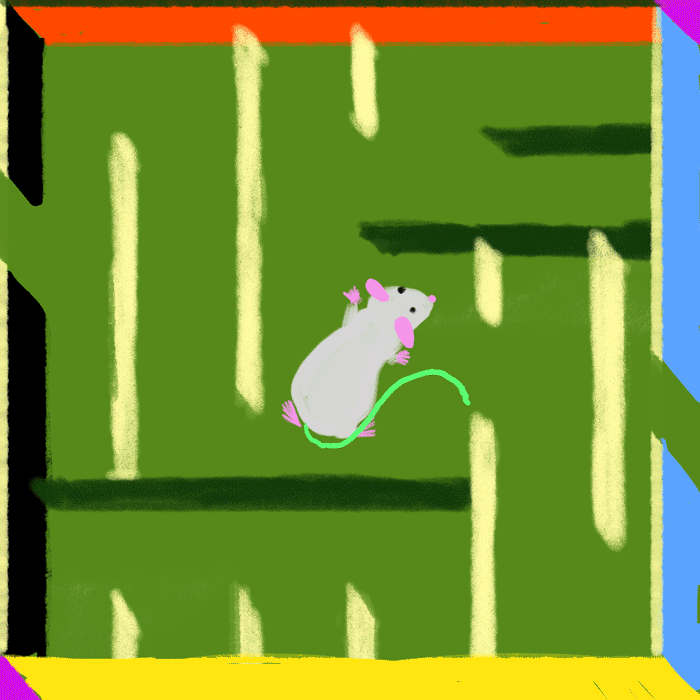
Walking in the Market
The Famished Road by Ben Okri
The market in the Yoruba literary tradition is an enchanted place. It is largely a human space, but it intersects with other planes of existence. This multi-dimensionality makes the market a tricky space to roam. In this scene, a little boy goes to the market in search of his mother and records the confounding experience of taking infinitely circular and mind-twisting routes.
I walked for a long time, the street burning my soles, my throat dry, my head sizzling, till I reached the market. There were stalls of goods everywhere. And filling the air were the smells and aromas of the market place, the rotting vegetables, the fresh fruits, the raw meat, roasted meat, stinking fish, the feathers of wild birds and stuffed parrots, the wafting odors of roasted corn and fresh-dyed cloth, cow dung and Sahelian perfume, and pepper-bursts which heated the eyeballs and tickled the nostrils. And just as there were many smells, so there were many voices, loud and clashing voices which were indistinguishable from the unholy fecundity of objects…I went from stall to stall, my head barely reaching the heights of displayed goods. I often found myself staring into the dead eyes of fishes, into basins where great crabs and giant lobsters were entangled in their mass of claws, in buckets where hammer-headed fishes and eels whipped their tails against the aluminum. Then, suddenly, with the sun burning itself into evening, with so many people around, everyone active, everything moving, I was overcome with a strange panic. I couldn’t see a single familiar face in that jostling universe. And then just as suddenly, in flashes of lightness and dark, I began to see Mum everywhere. I saw her writhing in the basin of eels. I saw her amongst the turtles in the plastic buckets. I saw her among the amulets of the sellers of charms. I saw her all over the market, under strange eaves, in the wind that spread the wood smoke and the rice-chaffs; I felt her everywhere, but I couldn’t break the riddle of the market’s labyrinths where one path opened into a thousand faces, all of them different, most of them hungry in different ways. I saw women counting their money and tying it at the ends of their wrappers. Children, abandoned temporarily, cried on the floor, under the stalls. I walked round and round the market spaces, unable to go any deeper, unable to find my way out, unable to go on because my feet hurt, and unable to stop because of the perpetually moving crowds who pushed me on or shoved me aside or trampled me or shouted at me and I was confused by everything and I sat under a stall of snails and wept without any tears.
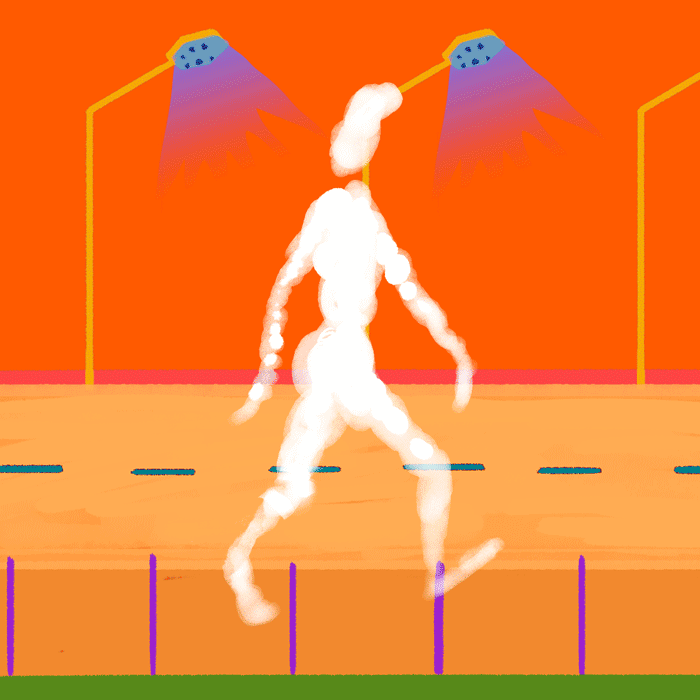
Walking into Crowds
Open City by Teju Cole
Rebecca Solnit has written about the difficulty of getting lost in cities. In this passage, Julius doesn’t get lost in his long walks through the streets of New York City. But he finds it difficult sorting through the “numerous incidents and sights” from his walks. There is a gap between his freedom and ability to roam city streets and his ability to make sense of what he encounters.
At first, I encountered the streets as an incessant loudness, a shock after the day’s focus and relative tranquility, as though someone had shattered the calm of a silent private chapel with the blare of a TV set. I wove my way through crowds of shoppers and workers, through road constructions and the horns of taxicabs. Walking through busy parts of town meant I laid my eyes on more people, hundreds more, thousands more, than I was accustomed to seeing in the course of a day, but the impress of these countless faces did nothing to assuage my feelings of isolation; if anything, it intensified them. I became more tired, too, after the walks began, an exhaustion unlike any I had known any I had known since the first month of internship, three years earlier. One night I simply went on and on, walking all the way down to Houston Street, a distance of some seven miles, and found myself in a state of disorienting fatigue, laboring to remain on my feet. That night I took the subway home, and instead of falling asleep immediately, I lay in bed, too tired to release myself from wakefulness, and I rehearsed in the dark the numerous incidents and sights I had encountered while roaming, sorting each encounter like a child playing with wooden blocks, trying to figure out which belonged where, which responded to which. Each neighborhood of the city appeared to be made of a different substance, each seemed to have a different air pressure, a different psychic weight: the bright lights and shuttered shops, the housing projects and luxury hotels, the fire escapes and city parks. My futile talks of sorting went on until the forms began to morph into each other and assume abstract shapes unrelated to the real city, and only then did my hectic mind finally show some pity and still itself, only then did dreamless sleep arrive.


